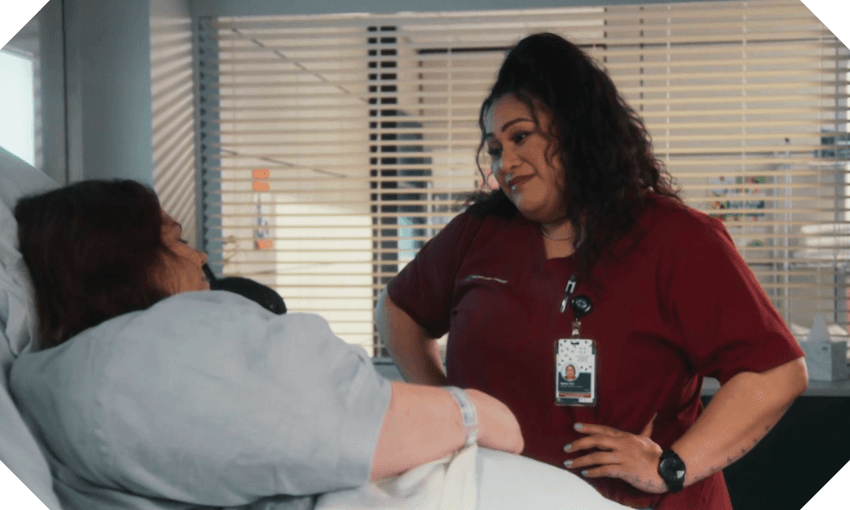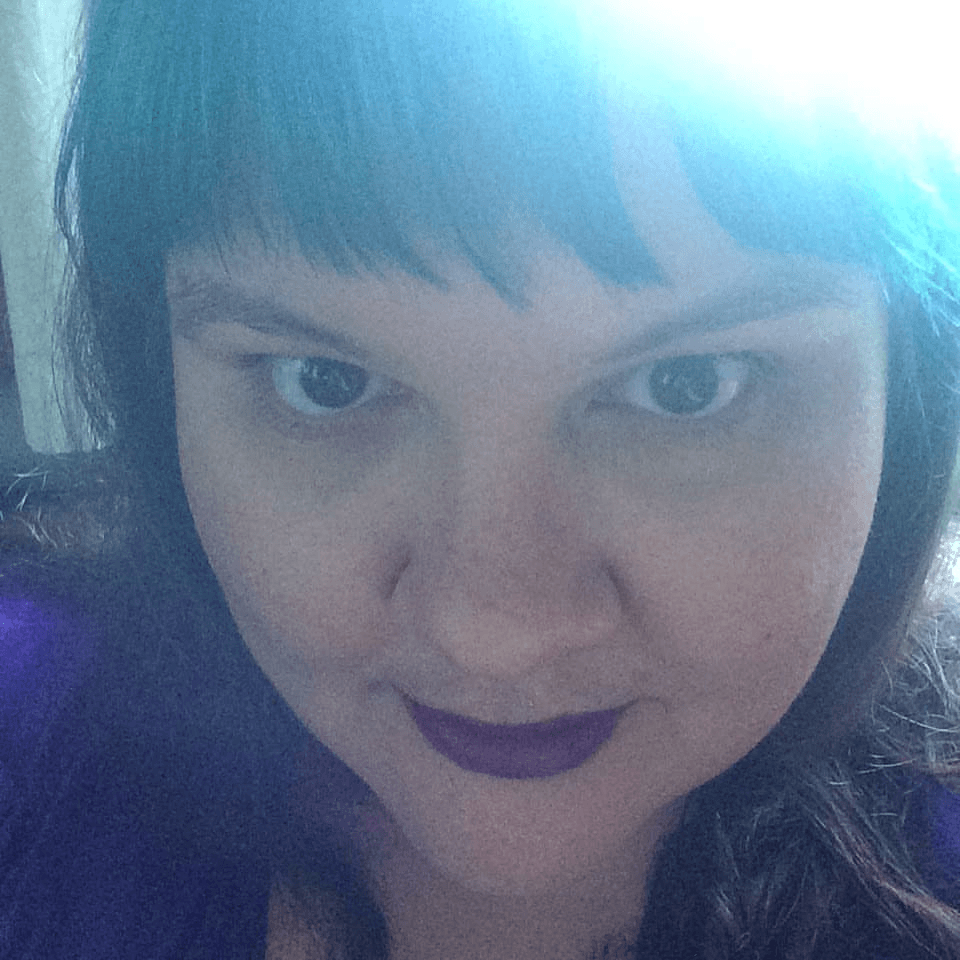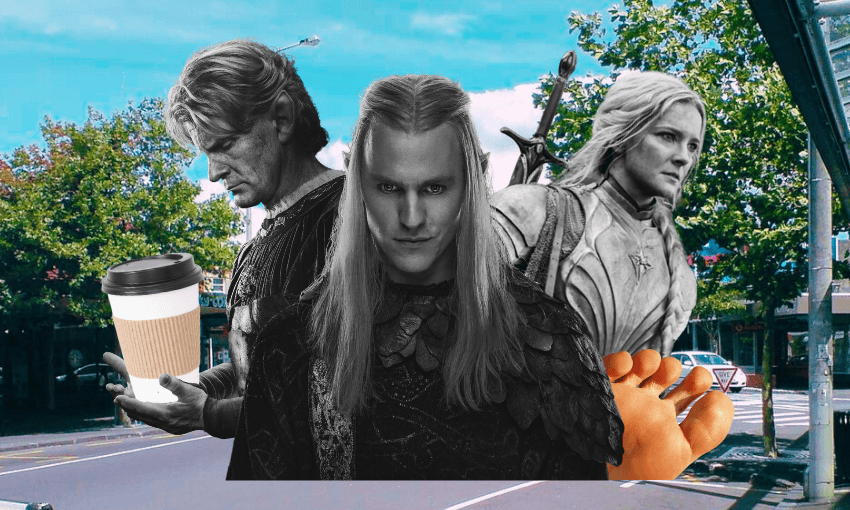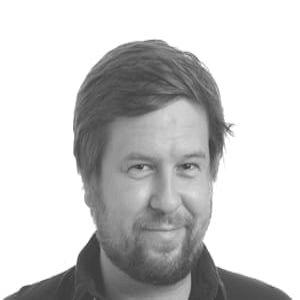Joanna McLeod has been campaigning for years for our beloved soap to include a fat character. This week, it delivered.
Last week, something extraordinary happened on Shortland Street. Selina, the show’s first fat main character, used her lived experience of fat phobia and weight stigma within the health system to advocate for the fat patient she was nursing who had come in for a standard surgery and been greeted with revulsion by her doctor.
And this care shouldn’t be a huge thing, but it actually is.
Before I go any further, I probably have to state that fat is a neutral term. It’s a physical description, not an indicator of health or moral character, just the same as being tall or brunette. Now imagine how weird it would be if Shortland Street had gone over 30 years without a brunette main character. And yet, before Bella Kalolo-Suraj joined as nurse Selina To’a in 2023, that’s where we were at.
Back to the storyline. Fat liberation is literally my job as part of running my ethical clothing company, so for years I have been complaining about a lack of fat characters on Shortland Street and campaigning for our inclusion. It should not be controversial to say that a cultural institution, that aims to depict a broad spectrum of New Zealand, should actually show us at our broadest too.
So I sent emails to producer Oliver Driver, complimenting the show’s work with intersex and trans characters, but asking when there’d be a character who couldn’t just walk into Glassons and buy clothes off the rack. When Kelly Martin, head of South Pacific Pictures was profiled in a magazine saying she dug her heels in for diversity, I headed for her inbox too. Neither of them replied to me.
I even pitched a piece on the missing fat characters to this very publication but was told it “wasn’t the right fit”, so I just published it myself. Anytime I was approached by the media as a “dial-a-fatctivist”, I made sure to mention Shortland Street’s missing fat people. “If you want a fat character, hire a fat actor cos they’re certainly not busy on Shortland Street” I wrote in this piece about The Whale.
After years of campaigning, the stunning Bella Kalolo joined the Street, and you bet I was excited. Prior to last week, Selina had no specifically fat storylines, which was a welcome relief. Fat women usually only exist on TV as the comic relief best friend and/or to be seen as struggling with weight loss (rather than struggling with fat stigma in a society that hates fat people).
Instead, Selina arrived a fully formed character – struggling with raising a kid, getting fair pay at work, fighting with her brother’s fiance and being drawn in by the inevitable Chris Warner tractor beam to his deadly loins. But Shortland Street can’t be all easy escapism (witness its recent collapsing health system, and racist efforts to suppress te reo Māori signage in the hospital), so when Selina’s first “fat” storyline came up, it was a big one (I get to make that joke).
A fat patient came into the hospital, and Selina was incredible. When patient Jocelyn worried that the blood pressure cuff wouldn’t fit her “giant arms”, Selina cheerily replied ‘“the usual ones don’t fit me either babe, so I got this one.” When Jocelyn asked if it was possible to get a larger robe, Selina said “I’m sorry, we really should have more sizes available, but I’ve got this trick where you can wear a second one backwards like a dressing gown.” This acknowledged that it was the hospital that was falling short, and that Jocelyn deserved to be treated with dignity.
Oh my Lorde, I felt so SEEN. I’ve had people at a gym freak me out by telling me my blood pressure was dangerously high when they were actually using the wrong size cuff (I generally have perfect blood pressure, thanks for asking). I’ve had to educate a bunch of vaccinators that you need to use a 38mm needle for larger patient Covid vaccinations, had to wait while they fetched the right needles and then not be able to sit down to wait for the 15 minutes because only flimsy plastic chairs were provided. I was finally seeing my own experiences reflected accurately on screen.
Later, when checking on a painful infection Jocelyn had been hiding, Selina empathised with her. “It’s hard when your body size makes you a problem before you’ve walked into the room, isn’t it?” She then correctly pointed out to thin white doctor Phil that skin infections can happen to anyone (there is not a single illness exclusive to fat people, and weight and health are absolutely not the same thing), asking how Jocelyn would be treated if she was smaller, and she used her own experience to help the fatphobic doctor see things in a different light.
Crucially, Selina’s brother Viliami – a former professional rugby league player and personal trainer – also showed the allyship that non-fat people need to demonstrate. When the doctor turned up her nose and said “how could anyone let themselves get like this”, Viliami explained that calories in/calories out as a magic formula for weight loss was something that’s been debunked a long time ago. By that stage of the episode I was bawling – it was exactly what’s been missing on our screens.
Later, when the patient needed surgery for her infection, Selina explained to Phil how hard it is when you’re judged for your body before you even open your mouth, especially in a doctor’s office. I instantly had flashbacks to all the GPs I’ve seen. One doctor asked if I was just depressed because of my low self-esteem due to being overweight, when it was actually undiagnosed ADHD. He also told me to “go for some walks and cut down on sugar” when I went in for a completely unrelated ear infection from frequent swimming. He never asked about my diet.
Then there was the psychiatrist who, as I cried describing how suicidal I was after the exhaustion and brain fog from long Covid, wrote down “patient should get some more exercise” – when over exertion is known to make long Covid symptoms worse. I have a friend whose knee tumour was missed by a doctor who proposed weight loss surgery instead, and there are thousands and thousands of other stories just like this that I could tell you. This is why so many fat people hesitate before going to the doctor, because they’re infantilised and not listened to.
Unfortunately, in a move that felt kind of like fridging your gays, Jocelyn died this week at Shortland Street hospital. But at least when the brash Dr Drew said “she was always fighting an uphill battle, which was complicated by her BMI”, Dr Phil stepped in. “Actually, I’m not sure that her BMI was a factor, because Jocelyn was fighting a multi-resistant organism which made all our treatment attempts futile. Her BMI was inconsequential.” Drew’s wife – also a doctor – agreed that they needed to move with the times. And Selina got to have the last, very accurate word: “BMI is trash!”
In response to my post about this storyline on social media, one of the nurse-writer consultants Alison James said they were very proud of it and had been pushing for it for a year. Thank you so much Alison. This storyline tackling medical fatphobia and its consequences is groundbreaking, and I’m so, so grateful to see something this realistic and relatable depicted on our screens. And soon I’ll be writing to all those producers who I’ve hassled over the years to thank them as well.





